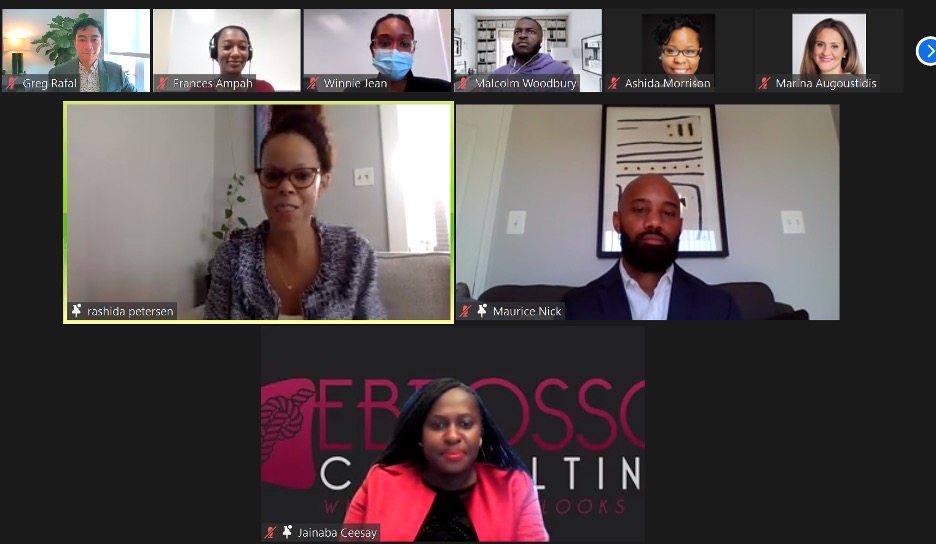
What is the Black experience in the workplace and how does it change in global business contexts?
Maryland Smith alumni shared their thoughts this week as part of the “Passion for Diversity Dialogue Series: Black and Abroad” panel discussion. The virtual event was hosted by the Center for Global Business in partnership with the school’s MBA Association and the Black MBA Association, as part of a weeklong lineup of events marking International Education Week.
The panel featured alumni Maurice Nick ’12, MBA/MS ’16; and Jainaba Ceesay, EMBA ’17, and was moderated by Rashida Petersen ’03, interim director of philanthropy of the Center for Cultural Power and founder and CEO of 1847 Philanthropic.
Nick, supply chain director for Tata Consumer Products, spoke about the differences in the way Black people are treated within organizations domestically and abroad.
“When dealing with countries abroad, race is a very nuanced topic. In America, people are grouped more holistically simply based on their shade of melanin, but other countries may treat you differently depending on where you’re from,” said Nick. “It can be hard to pinpoint if it’s colorism or racism, but there are unique issues everywhere. All are unacceptable.”
Ceesay, founder and CEO of EBROSSO Consulting, recounted her experience entering the American workforce as an immigrant from The Gambia. There’s a lot of stress for people of different backgrounds and how they might perceive “normal” situations compared to others, she said.
“It’s not always the case that just doing your best is all it will take for promotion in business. But entrepreneurship is one way to help level the playing field and there’s been a demand for that level of training in recent years,” said Ceesay.
Nick also touched on how COVID-19 impacted his ability to conduct supply chain business globally and the importance of gaining greater cultural awareness of foreign markets to understand how he could better mitigate any negative impact.
“Cultivating relationships with partners around the world was integral to making sure that we could continue being successful and positively impact business,” said Nick. “I was tasked with maintaining communication channels, and that’s what supply chain management is all about at the end of the day. If you’re not good at relationship building, you’re going to struggle in business, period.”
There is much more work that can and should be done toward diversity, equity and inclusion within organizations, Ceesay said. The first step, she said, is to make an effort. After that, change must start at the top.
“Leaders have to be willing to be more vulnerable and accepting of what people come to them with,” said Ceesay. “Unawareness can no longer be acceptable, and leaders must allow themselves and employees to be their authentic selves to create change.”
The Passion for Diversity Dialogue Series will continue in the spring 2022 semester. More information will be available soon.
The event was supported in part by a Title VI grant program known as CIBE (Centers for International Business Education) administered by the U.S. Department of Education.
Media Contact
Greg Muraski
Media Relations Manager
301-405-5283
301-892-0973 Mobile
gmuraski@umd.edu
About the University of Maryland's Robert H. Smith School of Business
The Robert H. Smith School of Business is an internationally recognized leader in management education and research. One of 12 colleges and schools at the University of Maryland, College Park, the Smith School offers undergraduate, full-time and flex MBA, executive MBA, online MBA, business master’s, PhD and executive education programs, as well as outreach services to the corporate community. The school offers its degree, custom and certification programs in learning locations in North America and Asia.